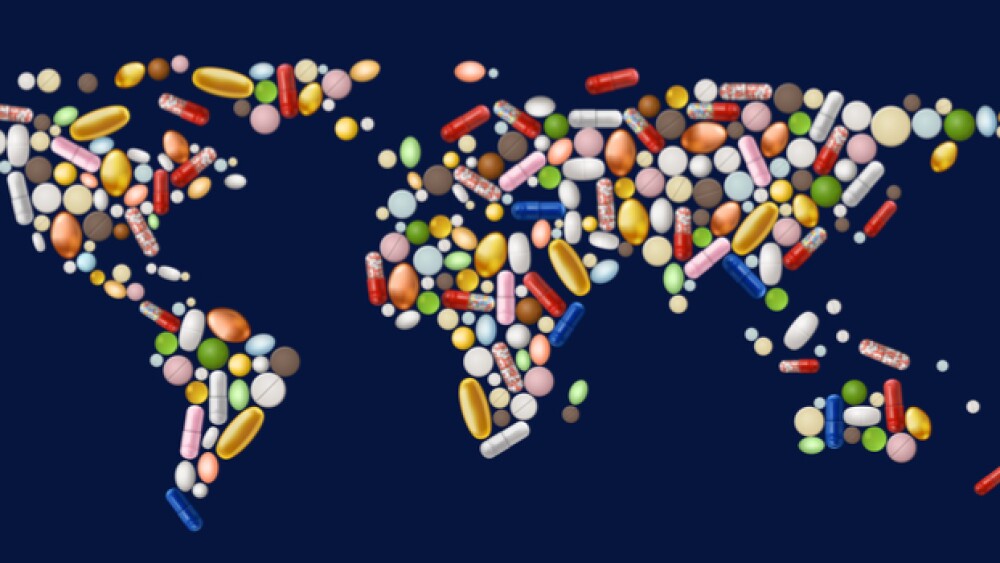Across the globe, pharma companies are making an impact. Last week BioSpace launched the first of a weekly roundup of international biotech and pharma news. Here’s the latest edition.
Across the globe, pharma companies are making an impact. Last week, BioSpace launched the first of a weekly roundup of international biotech and pharma news.
This week, global powerhouses Merck KGaA, Darmstadt, Germany and U.K.-based GlaxoSmithKline forged a deal worth up to $4 billion for the development of an immunotherapy for difficult-to-treat cancers. The companies will focus their resources on Merck KGaA’s M7824 (bintrafusp alfa), an investigational bifunctional fusion protein immunotherapy that is currently in clinical development for multiple difficult-to-treat cancers. This includes a Phase II trial to investigate M7824 compared with pembrolizumab as a first-line treatment in patients with PD-L1 expressing advanced non-small cell lung cancer (NSCLC).
The Merck KGaA asset is designed to simultaneously target two immuno-suppressive pathways, transforming growth factor-β (TGF-β) trap and an anti-programmed cell death ligand-1 (PD-L1), both commonly used by cancer cells to evade the immune system. Under terms of the deal, GSK, which has a renewed focus on oncology, will pay the Germany-based Merck €300 million in upfront money. The total potential deal value is up to €3.7 billion, a little more than $4 billion.
uniQure – Amsterdam-based uniQure treated the first patient in its Phase III HOPE-B trial that is testing AMT-061, an investigational AAV5-based gene therapy for the treatment of patients with severe and moderately severe hemophilia B. AMT-061 has been granted Breakthrough Therapy Designation by the U.S. Food and Drug Administration, as well as access to Priority Medicines (PRIME) regulatory initiative by the European Medicines Agency.
Robert Gut, chief medical officer of uniQure, said the dosing of the patient is a milestone for the company and the gene therapy field. He said this could be a one-time treatment for hemophilia B. The company anticipates the Phase III trial will enroll 50 adult patients with hemophilia B classified as severe or moderately severe. The primary outcome measure is the assessment of Factor IX activity 26 weeks after AMT-061 dosing. Secondary outcome measures include annualized bleeding rate and usage of Factor IX replacement therapy over a 52-week time frame.
Follicum – Those concerned about hair loss could soon have a new option. Sweden-based Follicum noted that its in-vivo hair loss treatment FOL-005 was successful in helping new hair growth. The study shows that treatment with Follicum’s newly developed formulation results in good hair growth comparable to that of minoxidil, a leading commercial product. The results of the study will form the basis for dose selection in future clinical studies aiming at studying dose-response in alopecia patients, the company said. Follicum Chief Executive Officer Jan Alenfall said the results from the first in vivo study of the new topical formulation of FOL-005 showed that the treatment had a clear effect on hair growth.
“In previous in vitro tests, we have shown that FOL-005 is transported to the hair follicles. The fact that we have now also found that the treatment in vivo produces a clear effect on hair growth is very pleasing and a great step towards a final product,” Alenfall said in a statement.
Elypta –Also in Sweden, Elypta snagged €2.35 million (about $2.67 million) from EU’s Horizon 2020 program as it aims to bring novel cancer-test to market. In a statement, the company said the grant will fund the first ever multicenter trial for diagnoses of renal cell carcinoma (RCC), which will be aimed at validating the company’s innovative metabolism-based liquid biopsy platform for early detection of recurrent RCC. Elypta was one of 60 European companies out of around 2,000 original applicants to receive a Phase II grant in the latest funding round.
Elypta’s early detection program involves measuring a unique panel of metabolites whose composition has been found to be altered in the blood and urine of cancer patients, allowing identification of distinct “signatures” using machine learning, the company said. These signatures or biomarkers are exceptionally sensitive and can be identified for a variety of cancers, Elypta added.
Elypta CEO Karl Bergman said the metabolism-based approach “using easily collected blood or urine samples allows for a safe and highly sensitive test that is ideal for close follow-up of cancer patients.” In the coming years, the company plans to initiate more trials to benefit patients across cancer.
“This grant also allows us to start growing the Elypta team to deliver on our plan and commitment to EU. We also expect to raise more capital to fully address the opportunities we see,” Bergman said in a statement.
Aigenpulse – U.K.-based Aigenpulse, a big data technology company, achieved certification to the internationally recognized standards ISO 9001:2015 and ISO 27001:2013. ISO accreditation strengthens Aigenpulse’s platform offering, which deploys artificial intelligence (AI) and advanced machine learning technologies to help researchers to unlock the power of their data, ultimately increasing the efficiency at which new and improved drugs reach patients, the company said. Scientists use the platform to structure, share and analyze their research, translational and preclinical data.
Calliditas Therapeutics – Stockholm-based Calliditas received Orphan Drug Designation from the FDA for the treatment of autoimmune hepatitis (AIH). AIH is a chronic, autoimmune disease of the liver that occurs when the body’s immune system attacks liver cells causing the liver to be inflamed. It is estimated that the patient population in the US amounts to approximately 50,000. The company plans to agree to the regulatory pathway for this indication in consultation with the FDA later this year.
“We are very pleased to receive ODD in the U.S. for the treatment of AIH. This confirms the high unmet medical need and further encourages us to continue to explore orphan indications in which we could leverage our existing expertise. This is a devastating disease with few medical alternatives today, which we believe is the case also in other chronic liver indications”, Renée Aguiar-Lucander, CEO of Calliditas Therapeutics, said in a statement.





